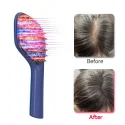2024-04-29
Hair loss is a common concern that affects individuals of various ages and genders, often leading to a search for effective solutions. Laser helmets have gained attention as a non-invasive option for combating hair loss, but questions persist about their effectiveness. In this article, we'll delve into the science behind laser helmets, examine their potential benefits, and address the question: Do they work against hair loss?
Understanding Laser Helmets:
Laser helmets, also known as laser hair growth or therapy helmets, are wearable devices with low-level laser diodes or LEDs emitting light at specific wavelengths. These helmets are designed to deliver low-level laser therapy (LLLT) directly to the scalp, aiming to stimulate hair follicles and promote hair regrowth. Unlike surgical procedures or medications with potential side effects, laser helmets offer a non-invasive and convenient approach to addressing hair loss.

Mechanisms of Action:
The efficacy of laser helmets in treating hair loss lies in their ability to stimulate cellular activity in the scalp through photobiomodulation. When the low-level laser light is absorbed by scalp tissues, it triggers biochemical processes that can lead to:
Increased Blood Circulation: Laser therapy enhances blood flow to the scalp, ensuring that hair follicles receive essential nutrients and oxygen for healthy growth.
Activation of Dormant Follicles: By energizing dormant hair follicles, laser helmets can coax them into the active growth phase (anagen phase), leading to the production of thicker, stronger hair strands.
Reduction of Inflammation: LLLT has anti-inflammatory effects, which can benefit individuals with inflammatory scalp conditions contributing to hair loss.
Examining the Evidence:
Clinical studies and research trials have provided insights into the effectiveness of laser helmets for hair loss treatment. While individual results may vary, several studies have reported positive outcomes, including:
Improved Hair Density: Users of laser helmets often experience an increase in hair density, with noticeable improvements in areas of previous thinning or balding.
Reduced Hair Shedding: Laser therapy can help minimize excessive hair shedding, preserving existing hair and promoting a fuller, thicker appearance.
Enhanced Hair Quality: Users may observe improvements in hair texture, strength, and overall health after consistent use of laser helmets.
Factors Influencing Effectiveness:
Several factors can influence the effectiveness of laser helmets in addressing hair loss:
Consistency: Regular and consistent use of laser helmets is crucial for optimal results. Most manufacturers recommend using the helmet several times per week for a specified duration.
Duration of Use: It may take several weeks to months before significant improvements in hair growth and quality become noticeable. Patience and persistence are key.
Individual Variability: Response to laser therapy can vary among individuals based on factors such as age, underlying health conditions, genetics, and the extent of hair loss.
Combining Therapies for Comprehensive Treatment:
For some individuals, combining laser helmet therapy with other hair loss treatments such as topical solutions, oral medications, or professional procedures may yield enhanced results. Consulting with a healthcare provider or dermatologist can help create a personalized treatment plan tailored to individual needs.
Addressing Myths and Realities:
Myth: Laser helmets provide instant results.
Reality: Laser therapy is a gradual process, and visible improvements may take time to manifest. Consistent use is essential for long-term benefits.
Myth: Laser helmets work for everyone.
Reality: While many users experience positive outcomes, individual responses can vary. Factors such as the underlying cause of hair loss and adherence to treatment protocols can influence results.
Myth: Laser helmets are a standalone solution for hair loss.
Reality: Laser therapy can be a valuable component of a comprehensive hair loss treatment plan but may be more effective when combined with other interventions.
In Conclusion:
Laser helmets offer a promising and non-invasive option for individuals seeking to address hair loss and promote hair regrowth. While results may vary, the growing body of evidence and positive user experiences support the efficacy of laser therapy in improving hair density, reducing hair shedding, and enhancing overall hair quality. By understanding the mechanisms of action, adhering to treatment protocols, and considering individual factors, laser helmets can be a valuable tool in the quest for healthier, fuller hair.










